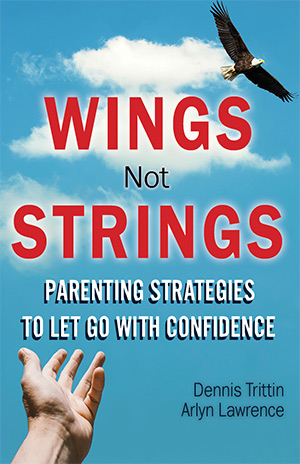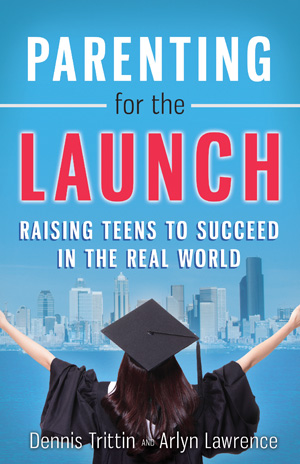Is Your Parenting Style Affecting Your Teen's Behavior?
 How would you describe your parenting style? And, how would you characterize your child’s attitudes and behaviors? The truth is, they’re connected in more ways than we realize. Although parenting isn’t about “picking a style” and running with it, we do have some tendencies that stem from our background, experiences, desires, and beliefs.
How would you describe your parenting style? And, how would you characterize your child’s attitudes and behaviors? The truth is, they’re connected in more ways than we realize. Although parenting isn’t about “picking a style” and running with it, we do have some tendencies that stem from our background, experiences, desires, and beliefs.
Borrowing from our latest book, Wings Not Strings: Parenting Strategies to Let Go with Confidence, let’s delve into three of today’s most common parenting styles which are creating “strings” and attitude issues in many emerging adults. You might recognize some of your own habits here—we all will to some degree—but the goal is becoming more self-aware of how our parenting can affect our children in unexpected ways.
Helicopter Parenting
Most of us have had that boss. You know, the one who is always looking over your shoulder, making endless suggestions, asking for status reports on the hour, constantly correcting your work, nagging you when you’re not perfect, taking credit for your work, making decisions that are rightfully yours, and micromanaging you to death. That hovering boss who is all about control. The boss who drives you crazy!
Yes, as parents, we can be that boss to our teens and adult children! And, frankly, they don’t like it any more than we do when we’re treated this way. The fact is, when we go overboard in pursuing helicoptering strategies with our children, it stunts their social-emotional growth and skill development, and it robs them of the joy of learning and doing things themselves. Meanwhile, it deprives them of learning from their mistakes—arguably the best character and resilience builder of all. Finally, it causes major relationship strains that are difficult to overcome.
Here are some common behaviors and telltale signs of this parenting approach:
· interfering with their child’s homework to the point of doing it themselves
· micromanaging chores/household responsibilities to the point of doing it themselves
· texting their kids constantly, even during school hours
· frantically managing their children’s schedules and giving endless reminders
· making decisions that rightfully belong to their teen
· overly protecting and rescuing kids from failure or minor risks
Why is helicopter parenting so common? Here are some root causes:
· our desire to control or manage outcomes
· a lack of trust and confidence in our children’s abilities and judgment
· fear of failure
· perfectionist tendencies (we can do it better/faster)
· a desire to be helpful without fully taking into account the long-term consequences
It is no surprise that we are observing the following unfortunate consequences in many emerging adults:
· low self-esteem and self-confidence
· weak decision-making and problem-solving skills
· poor motivation and work ethic
· lack of resilience and ability to cope with challenges
· difficulty handling conflict
· co-dependency
Helicoptering is a self-confidence destroyer in our children and places severe strains on our relationship with our children.
Performance Parenting
Although we naturally want our children to succeed, some parents take this to such an extreme that they appear to value performance more than the person. They can view their child's outcomes (especially their accomplishments) as a direct reflection of their parenting and apply intense pressure to perform to unreasonable standards. This style is especially common among professionally and economically successful parents who desire the same (or better) outcomes for their children.
Here are some typical behaviors and strategies of the performance-driven parent:
· perfectionist tendencies; excessive emphasis on minor shortfalls
· unrealistic expectations, regardless of the child’s ability, interest, personality, etc.
· verbal pressure to perform and harsh responses when the child fails to deliver
· competitive comparisons to siblings or other children
· complaints to teachers/professors when grades are lacking, or to coaches for inadequate play time (these are viewed as blemishes on their child’s resume)
· defending their child's misbehavior to authority figures
· placing pressure on their children to pursue the same colleges or careers as their parents (an unfortunate and unhealthy desire to create a “mini me”)
It is truly painful to listen to teens who are on the receiving end of this parenting style. These kids feel devalued. While not generally the intention of the performance parent, this is often the consequence—and it feels very real to their children.
Here are some root causes and motivators behind performance parenting:
· parental pride and ego taken too far
· excessive and misplaced identity in their child's outcomes
· the philosophy that pressure maximizes motivation and performance
· the belief that parents can/should control their childrens' outcomes
Predictably, here are some telltale signs of children who are living under the guidance of a performance parent:
· lacking self-worth
· anxiety, depression, or worse
· risk aversion and fear of failure
· narrow interests
· isolation
· inability to cope with underperformance or disappointment
· sibling rivalry
· resentment toward, and distance from, parents
While all of us should have high standards for our children, we need to be mindful of the risks when taken to excess. The consequences can be, and often are, devastating.
Permissive (Buddy) Parenting
As parents, we have a natural desire to raise happy children and provide a harmonious home environment. But, as those of us who have launched children can attest, the teen years can be especially challenging as our kids express their independence and the sparks start to fly. So, it’s not surprising to long for the years when our children were more compliant and respectful when they needed (and seemed to like) us more. This can creep into our parenting if we’re not careful.
In response, many parents are pursuing a child-centric approach to life and inadvertently raising children who think the world revolves around them. At the extreme, these parents abdicate their authority and let their children effectively run the show.
Here are some common examples of this lenient parenting style:
· treating their children as their friends, with an intense desire to feel liked
· failing to enforce discipline, standards, and consequences; enabling
· catering to their child’s desires; making excessive time allowances for technology and other forms of entertainment
· tolerating disrespectful behavior
· doing their child’s chores
· living vicariously through their children
· being unable to move beyond the nurturing stage and treat their teen as a future adult
What are some underlying causes of this parenting approach? Here are several:
· disrespect of one’s parental authority
· overly prioritizing their child’s happiness and a “peaceful” household
· limited interests other than parenting (placing identity primarily in their role as mother or father)
· feelings of guilt, perhaps due to a divorce or a busy career; overcompensating
· lack of energy, especially in light of demanding careers and multiple-job situations
· overreaction to one’s own authoritarian upbringing (“I’ll never be like my parents!”)
· co-dependency
And, here are some telltale signs in children affected by permissive parenting:
· entitlement mentality; viewing the world as all about them
· lacking motivation and work ethic
· deficient leadership and life skills
· disrespect for authority figures and rules
· addiction to pleasure sources
· poor time management and productivity
Of course, we want our children to do well and be happy. However, in the teen years when the clock is ticking and we receive more pushback, parents often respond by giving in or controlling to an unhealthy degree. Striking a proper balance is every parent’s challenge.
Clearly, our childrens' attitudes and behaviors are the product of many influences. That said, when ours are demonstrating some of the qualities described above, it pays to consider whether our methods are contributing in some way. A healthy dose of parenting self-awareness can lead to some valuable, mid-course corrections and position our families for an even brighter future.
Tagged as: parenting, teens, wings not strings, parenting style, parenting advice, parenting for the launch, raising teens, career readiness, relatationships



















